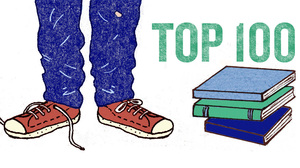This was a pleasant middle-of-summer surprise! NPR asked listeners to vote for their favorite YA novels of all times, and both SPEAK and WINTERGIRLS made the cut. (SPEAK was #26 and WINTERGIRLS was #99. Given that they only chose the top 100, that one was a little close!)
As lovely an honor as this is, it also made me sad. And angry and frustrated. This just might be the whitest YA list ever. And that is saying something, given that children’s literature is far from diverse. A Minnesota teacher blogged about the issues this raises for all readers. Please take the time to read her post – it is important.
If you are going to browse the NPR list, please also browse through the lists that are linked to over at Reading In Color. Pull all of these lists together and then you’ll have a robust resource for YA readers.
This list was announced almost a week ago and it has taken me this long to process what the honor means to me and what the unbalanced representation means to me, too. You could argue that since the nominations came from NPR’s audience, and that same audience voted for the finalists, that the exclusion of authors of color reflects those voters, and is not any oversight on the part of NPR. The fact that in the commentary, the NPR writers admit they had no idea who John Green was (he has FIVE books on the list and has become a YA force of nature) is another clue that the people involved have a lot to learn about the current state of YA literature.
But then I came across this short announcement, dated 8/2/12: “National Public Radio, criticized in recent years for a lack of diversity of its staff and coverage, is using a $1.5 million grant from the Corporation for Public Broadcasting to put together a six-person team to report stories on race, ethnicity and culture.”
Ya think?
I want to give NPR a thank-you, and also some kudos for at least acknowledging that YA literature is a genre worth paying attention to. But I’d like to challenge them to recognize the bias that they are operating with…. and to fix it. We cannot be a great nation unless and until all of our people are always seated at the table.
Contact the NPR Ombudsman and share your opinion.
Share your opinion with me, too. What do you think about this?



